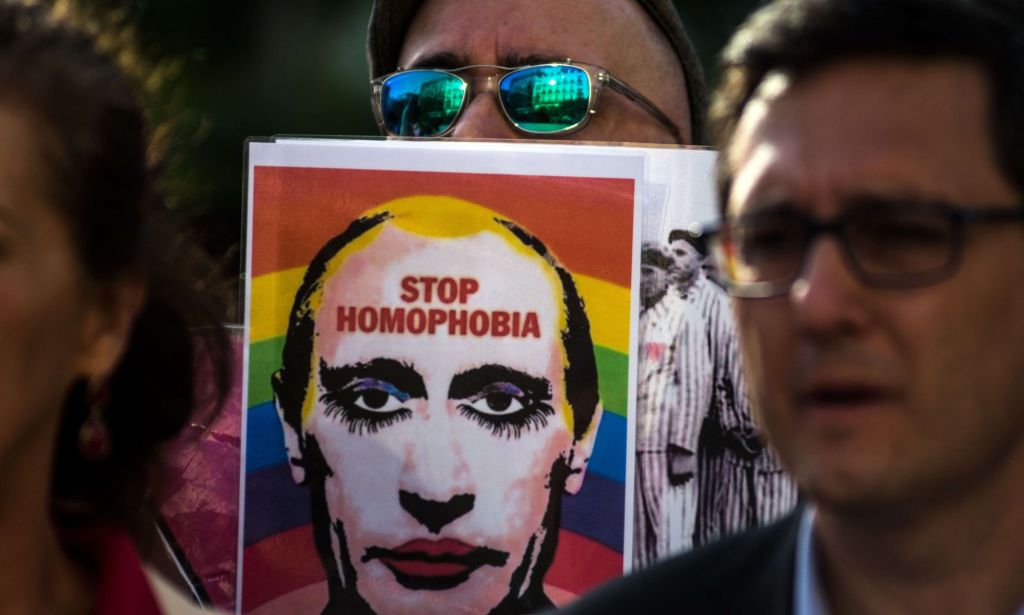Russia adds LGBTQ+ human rights group to controversial list

Under president Vladimir Putin, the Russian government has increasingly cracked down on LGBTQ+ rights, and several queer groups including NC SOS Crisis Group have been labelled ‘foreign agents’ by the state. (Getty).
Russian authorities added LGBTQ+ human rights defenders NC SOS Crisis Group to the country’s controversial ‘foreign agents’ registry.
The group was put on the list on Friday (5 May) along with the chair of the Anti-Corruption Foundation, Maria Pevchikh, and her associate Georgy Alburov.
NC SOS Crisis Group was designated ‘foreign agents’ by the Russian Ministry of Justice for allegedly carrying out “activities to promote LGBT relations, which is contrary to state policy to preserve and strengthen traditional Russian spiritual and moral values”, according to a press release from the group.
The organisation is a human rights project that helps LGBTQ+ people and their families who face harassment and pursuit from law enforcement in the North Caucasus region of Russia.
NC SOS Crisis Group said the situation in the North Caucus is “especially difficult for women, LGBTQ+ people and anyone who disagrees with the authorities”.
The group highlighted the horrific persecution of LGBTQ+ siblings Salekh Magamadov and Ismail Isayev in Chechnya, a region infamous for its abuse of queer people.
They also sounded the alarm when Idris Arsamikov, a gay refugee who fled Chechnya, was arrested by authorities in Russia when he returned for his father’s funeral.
After his arrest, Arsamikov went missing, and human rights groups have demanded Russian authorities ensure his safety and immediately release him.
“LGBTQ+ people are tortured, sometimes killed by their own relatives, and sometimes arrested and imprisoned,” the group said.
“In Chechnya, one of the republics in the North Caucasus, special ‘gay prisons’ are widespread.
“And in Dagestan, LGBTQ+ people are subjected to anti-scientific ‘conversion therapy’, when they are tried to be ‘cured’ of their homosexuality through torture.”
NC SOS Crisis Group said Russian authorities “encourage torture and murder in the region”.
By being listed as a ‘foreign agent’, the group stated that their life-saving work helping LGBTQ+ people will be ‘complicated’ by the additional hurdles such a label carries.

Under president Vladimir Putin, the Russian government has led an increasingly tough crackdown on queer rights, attacking LGBTQ+ rights groups and advocates.
In December 2022, Putin signed an expanded version of the country’s ‘LGBTQ+ propaganda’ law, which bans depictions of queer identities and issues in any media for people of all ages.
Human rights advocates have denounced Russia’s ‘foreign agents’ law, which has gradually been expanded since it was first passed in 2012, saying it seeks to silence dissenters of the government by branding them with a label that carries dark connotations in the country.
The designation is used by Russia as a hostile tag for people and organisations it deems to be engaging in political activity with foreign support.
Labelled individuals and entities are required by law to include a lengthy disclaimer in any publication, including on social media, regularly report on their income and spending and undergo financial audits.
NC SOS Crisis Group isn’t the first LGBTQ+ organisation to be labelled a ‘foreign agent’
Russia’s government deemed LGBTQ+ organisation Coming Out a ‘foreign’ agent in 2014. The Justice Ministry also added the Russian LGBT Network, Sphere Foundation and Mayak to their list in recent years.
LGBTQ+ individuals and advocates have been put on the list as well.
They include Igor Kochetkov, founder of Sphere and co-founder of the Russian LGBT Network; Maria Sabunaeva, head of the psychological service of the Russian LGBT Network; feminist Regina Dzugkoeva; and Yulia Tsvetkova, a LGBTQ+ activist and artist.

